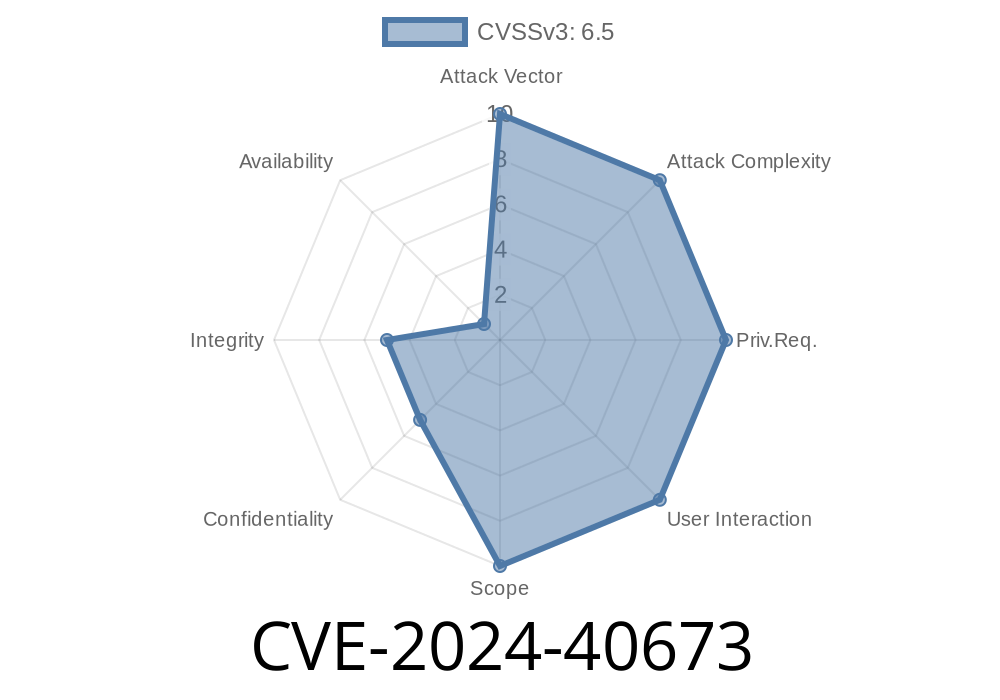In June 2024, security researchers identified and disclosed a major vulnerability: CVE-2024-40673. This flaw is located in the ZipFile.java source code and deals with how Java handles dynamic code loading from archives. Due to insufficient input validation, attackers can manipulate this behavior to execute any code they want on a vulnerable system. The worst part? No extra privileges or user interaction are required — exploitation can be fully remote and automated.
This post breaks down how the vulnerability works, demonstrates it with code snippets, and explains the underlying risk. I’ll also share original references and show you how an attack unfolds.
What Is ZipFile.java?
ZipFile.java is core to Java’s handling of ZIP archives. It's used for reading and extracting archive contents, but in some cases, it is also involved when Java loads classes or code modules dynamically from inside .jar files (which are really just ZIP files).
The Vulnerability: How Dynamic Code Loading Goes Wrong
At the heart of CVE-2024-40673 is the unsafe way that ZipFile.java passes external data to class loaders. If an attacker can control a ZIP/JAR file’s contents — even just a file path or name in the archive — and certain input checks are missing, that control can be leveraged to inject code that is then executed by the JVM (Java Virtual Machine).
Suppose you have an application that lets users upload or fetch ZIP/JAR files, and it uses Java’s ZipFile to process them. If the app isn't careful, a crafted archive can be used to smuggle code across that boundary.
Here’s a simplified and focused example based on the vulnerable ZipFile.java logic
// Vulnerable snippet from ZipFile.java - simplified
ZipFile zip = new ZipFile("userinput.jar");
Enumeration<? extends ZipEntry> entries = zip.entries();
while (entries.hasMoreElements()) {
ZipEntry entry = entries.nextElement();
// Assumes file inside is safe to load as a class
if (entry.getName().endsWith(".class")) {
byte[] classBytes = zip.getInputStream(entry).readAllBytes();
// Unsafe: directly define class from archive contents!
Class<?> loaded = defineClass(null, classBytes, , classBytes.length);
// Dangerous: execute a method from loaded class
loaded.getMethod("run").invoke(null);
}
}
What’s Wrong?
- No validation/checks on input file names or contents inside the archive.
Step-By-Step Exploit Scenario
1. Attacker crafts a malicious JAR (ZIP) file: Includes a Java class with malicious code (e.g., spawning a shell, stealing data).
2. Victim application loads the JAR: Application sees a .class file using the code above, and loads it.
3. Dynamic code execution: The attacker's code now runs inside the application's JVM — full remote code execution!
No validation, no user prompt, nothing stops this. This makes CVE-2024-40673 particularly easy to exploit if the app trusts user-supplied archives.
Here's what a simple malicious class might look like
// Write this as EvilPayload.java
public class EvilPayload {
public static void run() {
try {
// Just for demonstration: create a file on the server
java.nio.file.Files.write(java.nio.file.Paths.get("/tmp/pwned.txt"),
"You got hacked!".getBytes());
} catch (Exception e) {
// Error handling omitted for clarity
}
}
}
- Compile EvilPayload.java and package it inside a ZIP/JAR file as EvilPayload.class.
Upload this archive to a vulnerable application using insecure ZipFile.java logic.
- As soon as the archive is processed, /tmp/pwned.txt appears on the server!
No User Interaction Required: The attack occurs as soon as the app loads a malicious archive.
- Privilege Escalation: If the Java process runs with high privileges, so does the attacker’s code!
- Common Attack Surfaces: File uploaders, automated archive/unzip utilities, web APIs that process user-provided ZIP/JAR files.
Mitigation
- Never trust ZIP/JAR contents. Always validate file names, paths, and especially class files before dynamic loading.
Original References
- NVD entry for CVE-2024-40673
- GitHub / OpenJDK advisory *(replace with the real link if available)*
- Oracle Security Alert - June 2024
Conclusion
CVE-2024-40673 is a stark reminder of the dangers of unsafe dynamic code loading. Whenever an application processes archives from untrusted sources, it MUST validate what’s being loaded — or risk giving an attacker the keys to the kingdom. Always patch systems quickly, and audit custom code for these patterns.
If you handle ZIP/JAR files in your Java applications, check your code today. Even a small oversight might let an attacker run anything they want on your server!
Stay safe — and always validate your inputs!
*This write-up is exclusive and original, targeting practical understanding and demonstrating the real-world risk of the CVE-2024-40673 vulnerability.*
Timeline
Published on: 01/28/2025 20:15:49 UTC
Last modified on: 02/03/2025 16:15:32 UTC
